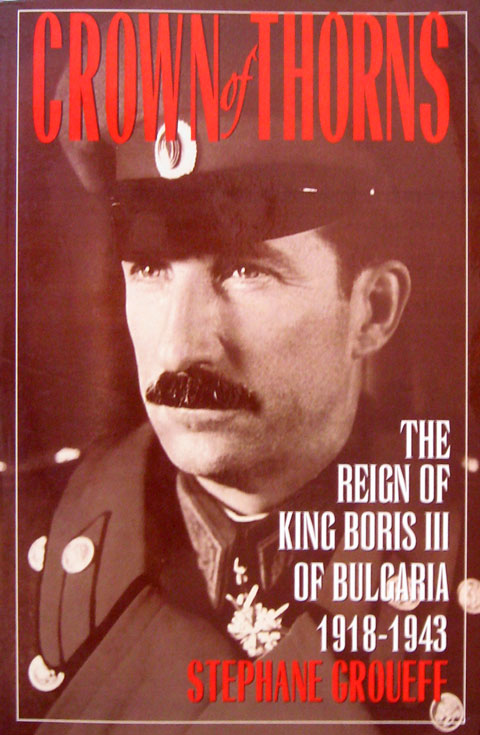 Crown of Thorns is an informative, well documented and entertaining biography of Boris III, written by Stephane Grueff, the son of a close advisor to the King. Originally published in 1987, the author released an updated edition in 1998 with a new preface reflecting events since the original publication date.
Crown of Thorns is an informative, well documented and entertaining biography of Boris III, written by Stephane Grueff, the son of a close advisor to the King. Originally published in 1987, the author released an updated edition in 1998 with a new preface reflecting events since the original publication date.
Much of the book reads like a novel, with liberal use of direct discourse in place of third person narrative. This style draws the reader into the story, adding a sense of drama that is peculiarly effective. By the end of the book the reader “knows” the King in a more personal way than would be possible from a simple retelling of events. Several times I found myself wrapped up in the moment, despite a distance of several generations.
The author’s love for his subject and personal diligence are evident in his frequent quotations and allusions to feelings and events that could not have been known without unusually open access to memoirs and other personal records of the King and his close associates. The reader is introduced to the King’s family relationships, hears his thoughts, shares his happy moments, and suffers with him through problems and mistakes.
Momentous events are recorded in detail and with emotion, often revealing the multifaceted nature of relationships in turbulent times. King Ferdinand’s palace meeting with Alexander Stambolisky, who would play such a large role in the early years of Boris’s reign, reveals some of the complexity of the royal court and the extent to which circumstances dictated actions. The older men were bitter political enemies, but dire conditions at the end of World War I forced Ferdinand to recall Stambolisky out of prison to seek the Agrarian leader’s help to quell disaffection among Bulgarian troops. Stambolisky could have scuttled the royal house right then, but Groueff shows us how he tipped his hat instead in support of the Crown Prince:
As Stambolisky was about to leave, Ferdinand asked him, “You know my son, the Crown Prince? Would you like to talk to him?”
“With great pleasure, Your majesty!”
He was sincere. Only moments before, when the King was bitterly accusing him of being motivated by antidynastic hatred, Stambolisky corrected him by saying that while disgruntlement against Ferdinand personally had indeed assumed menacing proportions, it was not necessarily directed against the royal institution itself. “I repeat,” The avowed republican had said, “that there is no resentment in our country against the dynasty, against the crown prince. He enjoys greater popularity than any politician who might try to compete with him, under another form of government.”
And with that simple exchange the passing of the crown from father to son became a certainty.
This little exchange gives us in microcosm a glimpse of what Groueff shows us over and over again: Boris is more a monarch buffeted by forces beyond his control than a driving force creating his own destiny. It seems Boris knows as much, hence the appropriateness of the book title. The crown Boris wears is in some sense a mockery, just as the Romans used a crown of thorns to mock Jesus Christ.
Details and anecdotes open up for the reader the personal struggles, deliberations and decisions of Boris as King. Most significant, of course, is the handling of Bulgaria’s fall into the clutches of Nazi Germany, which in hindsight would become the defining event of Boris’s reign. Groueff does an admirable job showing us just how early and unavoidably Bulgaria became entwined with Germany, then brings us right into the room to hear the final discussions leading up to joining the Tripartite Pact.
Two details stand out concerning that fateful decision. First, Groueff describes a real concern on the part of the King for the safety and future of the Bulgarian people. He is worried for his nation. His first choice would be to avoid war, but that option is not available. He objects emotionally to the prospect of entering the war, and does everything in his power to delay the decision.
Second, the King heavily weighs the choice between the Nazis and Bolshevism. Groueff quotes Prime Minister Filov’s argument for why they must join the German side:
“For us there is no other course, because war is unavoidable. If we realize this, it is best to arrange conditions that are the least painful for us. If we allow the Germans to simply pass through our country, they will treat us as an occupied land, like Rumania, much worse than if we ally ourselves with them. We cannot gain anything from an English victory, for the failure of German arms inevitably means we shall be bolshevized.”
Groueff summarizes the burdens of a troubled monarch on the day Bulgaria declared war on America and Britain:
Late in the afternoon, after the dramatic vote at the Sobranié, King Boris left the palace alone, and no one was able to locate him. Later in the evening, he was found in a remote corner of the darkened Alexander Nevsky Cathedral, a solitary figure, praying.
Boris III is best remembered perhaps for his role saving Bulgarian Jews from deportation to Nazi death camps. Groueff does a good job of sharing the complexity of this situation and does not candy coat the King’s wartime behavior. There were compromises made, and many manipulations. Groueff gives us many angles to the story.
The King’s last days are shared in deliberate detail. His last meeting with Hitler. An outing to the Rila mountains. The flurry of events surrounding his deathbed. His passing was widely mourned, and Bulgaria was never the same again.
Welcome to Bulgaria maintains a reference copy of this book for use by our Miracle Max members.
Contents
Preface
Preface to the Paperback Edition
Prologue
Defeat and Despair
Childhood and Youth
The Ephemeral “Radomir Republic”
The Abdication
The Debut of the Lonely King
The Stambolisky Regime
The Coup d’Etat
The September Uprising
The Macedonian Drama and the IMRO
The Bombing of Sveta-Nedelia Cathedral
A Period of Reprisals
True Democracy
The Royal Romance
The Bloc Years
The 1934 Coup
The King Takes the Reins
The Non-Party Regime
Pressure from All Sides
The Tripartite Pact
A Non-Belligerent Ally
The Jewish Deilemma
Communist Subversion
Meetings with Hitler, Feelers to the Allies
The Mysterious Death
Epilogue
References
Bibliography
Index
Bibliographic Entry:
Groueff, Stephane. Crown of Thorns: The Reign of King Boris III of Bulgaria 1918-1943, Lanham, MD: Madison Books,1998.



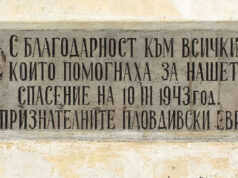

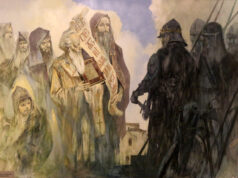
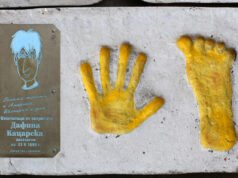
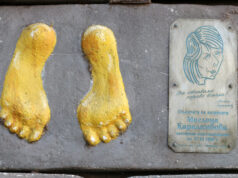
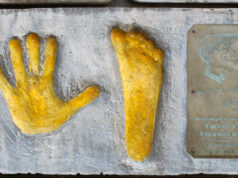
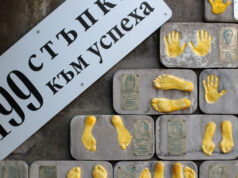
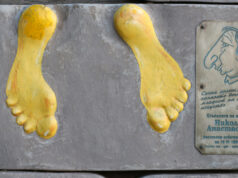

[…] footnote associated with the paragraph directed me to Crown of Thorns: The Reign of King Boris III of Bulgaria 1918-1943 by Stephane Groueff and A Concise History of Bulgaria by R. J. Crampton. Groueff mentions the […]